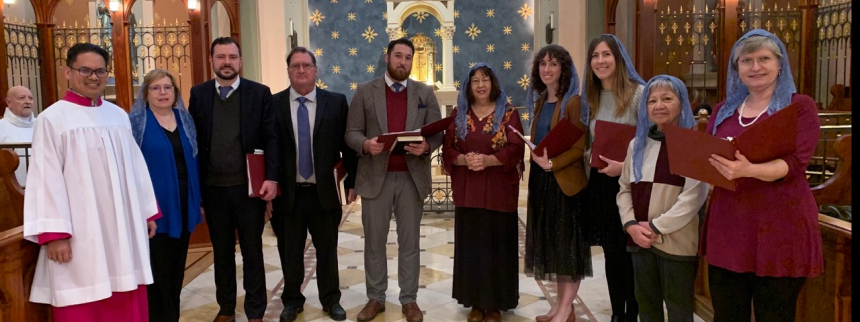
On Sunday December 8, the schola cantorum of St Patrick’s Catholic Church, Placerville, a.k.a. the “Hangtown Schola”, sang at the Cathedral of the Blessed Sacrament at the 11:00 a.m. Mass. The schola is made up of eight singers plus the director (three men and six women) ranging in age from early twenties to those in their 60s. The visiting schola began by singing the introit (entrance antiphon) appointed for the Second Sunday of Advent, “Populus Sion.” They sang from the Blessed Sacrament chapel located behind the altar. The acoustics of the cathedral are magnificent – ideal for a capella singing because of the hardwood and tile floors, the large space and lofty ceiling. A few minutes before the entrance procession the schola started singing. As soon as they opened their mouths a hush spread over the congregation. The whispers and quiet chit-chat going on before Mass stopped as people turned to listen. It was all very subtle. Almost imperceptible.
Without the aid of any artificial amplification the melismatic music rose above the congregation like a cloud of incense. It hovered for a moment and then slowly descended and enveloped the assembly like a warm blanket. The congregation became very quiet. The introit had had its effect. The music had gently led the people of God into a state of prayerful readiness, which was especially fitting for a Sunday in Advent. The mystical melody of the chant created exactly the right mood, preparing people for the sacred mystery about to unfold. Creating a quiet, prayerful mood at the beginning of Mass is essential for meaningful worship. The introit, when done well, does just that. The introit, as it were, opens the doors of heaven so that the people can more easily pass from “from the world wounded by sin to the world of the new Life to which all men are called.” (Catechism, no. 1186). The introit was followed by a few moments of silence and then the Cathedral choir began to sing the opening hymn, which was big and bold, the antithesis of the introit, but somehow they complemented each other beautifully.
Later, the schola sang the Offertory chant in English, followed by the Communion chant, “Jerusalem Surge,” which was sung in Latin. Like many parishes, the beginning of Communion at the Cathedral can be a little chaotic as the small army of extraordinary ministers of Holy Communion assembles behind the altar. Getting all those people into place so they can receive their communion can be awkward. They obviously tried to maintain as much decorum as possible but with so many people moving about, that part of the liturgy came across as muddled; until the schola began singing. When the schola began the Communion chant, suddenly order started to emerge from disorder. People started moving in a more a purposeful, dignified and orderly way. Not rigidly, but reverently. What began as a jumble of people trying to find a place to stand, turned into an orchestrated movement, a dance almost, that was serene and even elegant; all because of the effect that chant had on the liturgical action. It was as if the chant, like the Word of God at creation, brought order out of chaos. Maybe that’s a bit of an overstatement, but that’s the image that came to mind.
Chant, particularly Gregorian chant, is the Roman Catholic Church’s own music. It goes back to the earliest days of the Church and ultimately has its roots in the ancient melodies of the Temple and synagogue. Maybe it is because of its antiquity and the fact that chant sounds so unusual compared to conventional music that it has the effect that it does. Maybe it’s because of its unique musical form and the fact that chant possesses the quality of noble simplicity, that Vatican II identified as being one the chief qualities of the Roman (Latin) rite (Constitution on the Sacred Liturgy, 34). Maybe it is because chant is sung in unison without musical accompaniment, devoid of any beat, rhythm or tempo that it has that quieting effect on people which was so evident at Mass that Sunday. Maybe it is because the pure human voice is the closest thing on earth to the angels in heaven. Whatever it was, the visit of the “Hangtown Schola” to the Cathedral of the Blessed Sacrament was a special blessing to the Cathedral and those of us worshiping there that Sunday. It was a blessing to the members of the schola itself, who had worked long and hard to make it happen. The “Hangtown Schola,” by the way, is available to sing at your parish if you’d like to get an idea of what well-prepared chant can sound like. Just call St. Patrick’s Church in Placerville.

